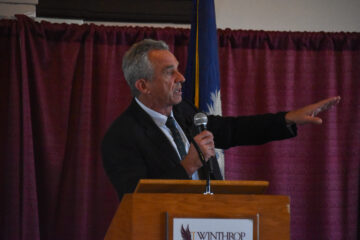The time of year defined by holidays and Christmas spirit has finally come.
The time of year when Walmart is full of Christmas trees and stores blast “All I Want for Christmas is You” by Mariah Carey throughout their stores. But it has also become the time of year when some individuals get upset and offended by cashiers and other strangers greeting them with the phrase “Happy Holidays” instead of “Merry Christmas.” Why do so many people get offended by this?
The reason that most people choose to say “Happy Holidays” is an effort to be more inclusive. Not everyone is of Christian faith and celebrates Christmas. Some people don’t celebrate any holiday, and some practice a different religion. There are those who celebrate Hanukkah, Kwanzaa or the Winter Solstice.
Many people who celebrate Christmas believe that choosing the greeting ‘Happy Holidays’ is “an insult or a denigration of Christmas,” according to Huffpost. NBC News also reported that the difference in how people react has to do with ideology, age and gender. They determined it would be better to say “Merry Christmas” to a 60–year–old Republican man from the South, whereas it might be better to say “Happy Holidays” to a 20–year–old Liberterian woman from the Northeast. A geographic map from Treetopia shows that the phrase “Merry Christmas” is mostly used in the South, also known as the Bible Belt.
The Philadelphia Inquirer says that saying “Merry Christmas” has gotten a bad reputation because of Fox News anchors and President Donald Trump inventing the “War on Christmas.” However, according to Denise Clay, a freelance writer from Philadelphia, “When you say ‘Merry Christmas’ instead of ‘Happy Holidays’…you are erasing the importance of experiences of people who don’t share your beliefs.”
Christmas does overshadow most other December holidays in America, but this doesn’t mean it is okay to erase these other holidays.
You may not know when you are talking to someone Jewish, Pagan or someone who celebrates Kwanzaa. Telling them “Merry Christmas” might offend them. “Happy Holidays” also includes the celebrations that come with New Years Eve and New Years Day. This phrase also includes birthdays that are celebrated in between the plethora of December holidays. Some people even start saying “Happy Holidays” in November to include Thanksgiving.
Since today’s society has become more inclusive and there are people of every religion everywhere, “Happy Holidays” is a more neutral alternative phrase that includes every holiday. Christians and those who celebrate Christmas should not get offended at the “Happy Holidays” phrase because Christmas is included in this, but “Merry Christmas” does not include other winter holidays.
Choosing to say “Happy Holidays” ensures that those who celebrate holidays that are often overshadowed by Christmas are still included in today’s society and culture.
Photo by Kaily Paddle




